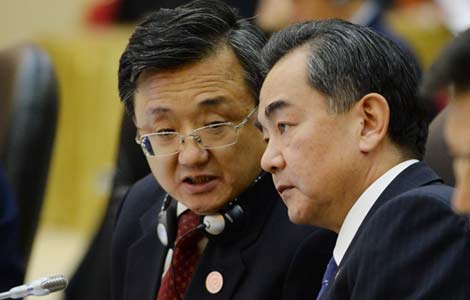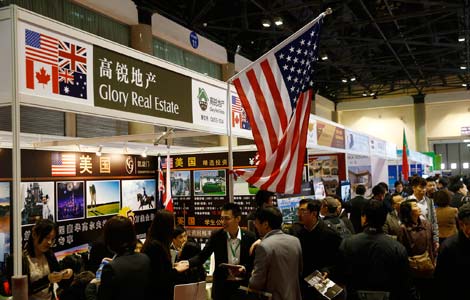Building on the bottom line
Updated: 2013-07-01 09:10
By Li Jingtian (China Daily)
|
||||||||
China and US should respect each other's core interests as they seek to build new type of relationship between powers
China and the US are now at a critical juncture in the development of their relations. The recent strategic and historic meeting between President Xi Jinping and President Barack Obama sets a direction for building a new type of major power relationship. Such a relationship is an unprecedented invention with historic significance. It requires painstaking efforts in all aspects from both countries.
The two countries' international status and influence determine that their relationship is one of the world's most important bilateral relationships, and it is of special significance to global affairs. A sound and sustained development of this relationship not only matters for the interests of the two peoples, but also has a significant impact on world peace, stability and prosperity.
First, as the world's two most important drivers of the global economy, China and the United States have an intertwined interest and are increasingly interdependent. From addressing international and regional hotspot issues to coping with global challenges, and from boosting domestic economic and social development to promoting the global economic recovery, the two countries share extensive common interests and so have broad space for cooperation.
We also need to keep working together in traditional areas such as economy and trade, energy, environmental protection and culture, seek cooperation in new areas such as cyber security and global governance, and strengthen our communication and coordination on international and regional issues, such as the situation on the Korean Peninsula, the Iranian nuclear issue and Syria. With these efforts we will be able to further expand our common interests.
Second, our common interests and challenges determine that only by peacefully coexisting can we work together to bring mutual benefit and opportunities. In contrast, confrontation can only do otherwise. This is why China always adheres to the principles of peace, development and cooperation and seeks a win-win situation through tolerance and mutual learning.
As the two countries have different conditions, it is impossible for us to agree on everything or share common interests in all aspects. So both countries need equality and mutual understanding. We can strengthen policy coordination and consider each other's interests and concerns, and avoid blaming each other for each other's own problems and contradictions in the development process, in this way we can achieve common prosperity and balanced development.
Third, the China-US relationship is affected by many persistent and complex structural factors, and it is undeniable that there are many differences, friction, conflicts and problems. Moreover, some people are still accustomed to viewing the China-US relationship with the mindset that a powerful country is bound to seek hegemony and the mentality of zero-sum competition. They believe that China's rise will affect the economy and security of the United States in all respects, and see China as a regional military rival, global economic competitor and comprehensive political opponent of the United States. All these are negative factors for developing a new type of relationship.
So how to accumulate the positive energy for development of a new type of relationship? I believe this can be done in two ways.
First, we can replace traditional values with innovative thinking. In the course of the development of human society, there have been conflicts, confrontations and even wars between major powers, especially between emerging powers and conservative ones, and a zero-sum game is the main characteristic of relations between major countries. Objectively, the rise of emerging powers is likely to cause conflicts with the existing powers, but this is not inevitable.
By building a new type of relationship between major powers, China and the United States can break the historical trend and explore a new road of relations among major countries. As President Xi said, "The vast Pacific Ocean has ample space for China and the United States".
To this end, China and the United States need to build mutual strategic trust and sound interaction, and avoid viewing each other as a potential and even a real "strategic rival", and avoid judging each other's strength and development trend from a contradictive, resistant or even hostile position and avoid taking precautions and containment against the other. China always insists on dialogue instead of confrontation, cooperation instead of conflict, being partners instead of adversaries, and pursuing mutual benefit instead of a zero-sum game.
Second, we should effectively control our differences to maintain the overall development of the China-US relationship. China and the United States have more common interests than differences, and we need to dilute and reduce differences. The two countries need to control the existing frictions and differences, keep them at a certain level and properly address and manage them through close communication and good interaction to ensure a proper understanding of each other's true intentions.
The two countries should respect and care for each other's major interests and concerns and strengthen the bottom line mindset. That is, we need to understand and respect each other's bottom line and not challenge or break through the bottom line of the other side. China never put its own interests above the interests of other countries, and it will never adopt a selfish beggar-thy-neighbor policy. But when it comes to safeguarding its national sovereignty, security and development interests, China has its own principles and bottom line. While being reasonable and considering the overall situation, China will never yield to any pressure from outside. No one should underestimate China's determination and ability to safeguard its national interests or expect China to swallow the bitter pill that harms its own interests.
The author is executive vice-president of the Party School. This article is based on his keynote speech at the 2013 China-US Academic Forum in Washington this month.
(China Daily USA07/01/2013 page11)

 Gay pride parade around the world
Gay pride parade around the world
 Four dead in Egypt clashes, scores wounded
Four dead in Egypt clashes, scores wounded
 New NSA spying allegations rile European allies
New NSA spying allegations rile European allies
 Foreign minister makes ASEAN debut as tensions flare
Foreign minister makes ASEAN debut as tensions flare
 Yao stresses transparency in charity
Yao stresses transparency in charity
 NYC's gay pride march for celebration
NYC's gay pride march for celebration
 Massive debt plagues local gov't
Massive debt plagues local gov't
 Looking abroad for better investment
Looking abroad for better investment
Most Viewed
Editor's Picks

|

|

|

|

|

|
Today's Top News
Chinese, US deals will grow this year
US updates duties on Chinese honey
Looking abroad for better investment
Mixed outlook for EV makers in China and US
Obama to announce new power initiative for Africa
China's June manufacturing PMI falls to 50.1
Longer term for visas to attract talent
Putin signs anti-gay measures into law
US Weekly

|

|






